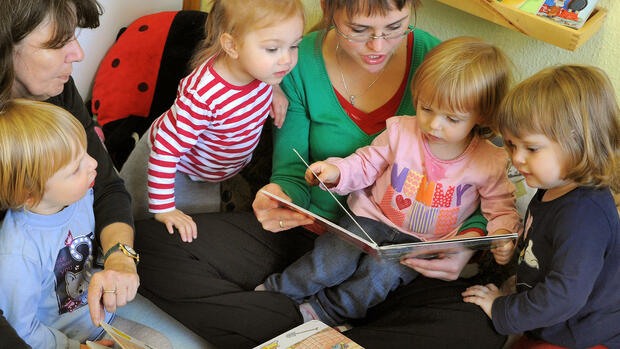
Tool of the week The right equity fund for children and grandchildren


German savers are rather reluctant to invest in securities for children and grandchildren. Such an investment has been profitable for years, history shows.
Frankfurt When children get fledged, they usually have expensive wishes – from a driver’s license to their own home. In order to be able to meet these requirements, every third German saver saves money for young people. That shows one current TNS Emnid survey commissioned by Postbank. However, only 21 percent dare to go public. Savings accounts, building society contracts, life insurance or even the piggy bank are much more popular when it comes to providing for the children.
It is striking: Parents, grandparents and godparents are particularly cautious with the dear little ones. After all, an average of 24 percent of Germans invest in securities. However, the ups and downs of the stock market prices seem too uncertain to invest in the baptism and birthday money of the children.
The following applies: "If you start saving for the youngsters early on and the savings do not have to be paid out on a fixed date, securities are a good way of generating profits above the inflation limit," says Karsten Rusch, Head of Product Management Investments & Insurance at Postbank. This is not for everyone, because you have to sit out fluctuations in value can, warn consumer advocates.
Despite the ongoing zero interest rate policy, the Germans are diligently saving – including in investment funds. The German banking association has examined which funds have paid off best in the past three decades. The association assumed a monthly investment of 100 euros. In contrast to other financial investments, investment funds offer more flexibility because investors are not tied to fixed terms, but perseverance is recommended for the highest possible return. Therefore, a period from 1987 to 2017 is considered in the comparison of the banking association. All fund costs including the maximum front-end load are already taken into account in the calculation, but tax aspects are not. Possible transaction costs are also not taken into account. The best investment funds at a glance.
Anyone who has invested in open-ended real estate funds with their savings in the past three decades, has in comparison to the other investment funds least return made. If an investor invested 100 euros per month between 1987 and 2017, he now has an average of 64,000 euros. With a total investment of 36,000 euros, the savings did not quite double in this case.
Pension funds with an international investment focus are a little more profitable: If you start from the same starting position as before – the saver invested a total of 36,000 euros from 1987 to 2017 (without possible transaction costs) – the investor will hold average after this period 69,000 euros, 5000 euros more than when investing in open-ended real estate funds. But it can be done even more effectively.
Euro bond funds performed even better compared to bond funds with an international focus: With the same investment strategy, the amount rose to an average value of 72,000 euros. The investor’s savings have doubled over the course of 30 years.
Anyone who was ready to invest in mixed euro funds in 1987 can look forward to today: this investment fund has paid off the third best in the past 30 years. If an investor has invested 100 euros per month in mixed euro funds, he can do it on average today 87,000 euros have.
Only equity funds provided even more returns. The investment fund that generated the second largest return in comparison with the banking association is the equity fund with an international focus. With the same investment strategy, the amount of money finally rose to an average of whole 105,000 euros. Thus, investing in international equity funds was the investment strategy among the funds with the second largest return.
However, the greatest return came from investors who had invested EUR 100 per month in equity funds focusing on Germany over the past 30 years. The 36,000 euros were thus on average 105,000 euros. That corresponds to a return of a good seven percent a year. This is the best way for German equity funds to develop compared to other investment funds.
Experts advise against individual shares when investing in children. Instead, investors should buy shares from the broadest possible diversified investment funds or so-called Exchange Traded Funds (ETF). A fund consists of numerous individual shares that the price risk for the investor is spread. In the case of an ETF, the composition reflects a certain index – for example the German stock index (Dax).
Anyone who buys shares in an ETF generally participates in a market development and, unlike an actively managed investment fund, does not rely on the skill of a fund manager, who may be able to dampen one or the other price decline through clever action. In return, ETFs are significantly cheaper in terms of management fees, whereas a fund manager first has to generate his costs in order to generate a profit for the investor.
RELATED ITEMS
-

Financial investment for children: children also pay taxes
Financial investment for children Pacifiers, school bags and savings plans If a deposit or account is in the child’s name, parents have one advantage: you save…
-

Financial investment for children as a tax-saving model
Children are a great asset in the life of parents and as high as the financial burden may be for some families: children are one…
-

Language test: German children don’t speak German
Language test German children do not speak German In German daycare centers, all children are tested for their language skills. In Berlin every tenth can…
-

Milking cow Germany: 343 million
TV station in front of the European Parliament in Strasbourg. Photo: That the Germans are governed more from Brussels than from Berlin and from a point of view…
